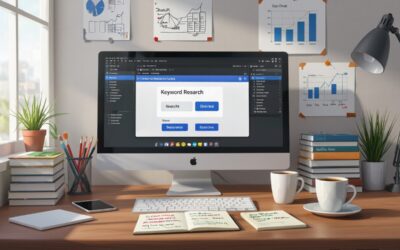Get Your Free Website SEO Audit!
If you’re a business owner just starting to explore SEO (Search Engine Optimization), reading an SEO report can feel like trying to decode a foreign language. But don’t worry—it’s not as complicated as it seems. Once you understand a few key metrics, you’ll be able to measure how your website is performing and make smarter decisions for your business.
This post breaks down the most common SEO report metrics in plain English—what they mean, why they matter, and how they impact your bottom line.
1. Organic Traffic – How Many People Are Finding You Through Google
What it means: Organic traffic counts the number of visitors who find your website by searching on Google (without clicking on ads).
Why it matters: This is the lifeblood of SEO. More organic traffic usually means more potential customers are finding your business online.
✅ Tip: If your traffic is going up month after month, your SEO is working.
2. Keyword Rankings – Where You Show Up in Google Search
What it means: Keyword rankings tell you where your website appears when people search for specific terms (like “plumber in Austin” or “best Italian restaurant near me”).
Why it matters: The higher you rank, the more likely people will see and click on your site.
✅ Tip: Focus on ranking for keywords that match what your customers are searching for—not just popular terms.
3. Click-Through Rate (CTR) – Are People Clicking on Your Site?
What it means: CTR is the percentage of people who click on your website after seeing it in the search results.
Why it matters: Even if you rank well, a low CTR means you’re missing out on clicks. This could be due to a bland or confusing title or description.
✅ Tip: Make sure your page titles and descriptions are clear, helpful, and match what the searcher wants.
4. Bounce Rate – Are Visitors Sticking Around or Leaving?
What it means: Bounce rate shows how many people visit your site and then leave without clicking to another page.
Why it matters: A high bounce rate can mean visitors didn’t find what they were looking for or your site didn’t load well.
✅ Tip: Make sure your pages are fast, easy to read, and give people a reason to explore more.
5. Pages per Session – How Deep Are Visitors Going?
What it means: This measures how many pages someone visits during a single trip to your website.
Why it matters: More pages usually mean people are interested in what you offer and are learning more before they buy or contact you.
✅ Tip: Add clear links between related pages (like from a product page to a testimonials page).
6. Session Duration – How Long Are Visitors Staying?
What it means: This tells you how much time visitors spend on your site on average.
Why it matters: More time usually means more interest. If visitors leave quickly, they may not be finding the info they need.
✅ Tip: Use videos, FAQs, and easy-to-follow content to keep visitors engaged.
7. Backlinks – Who’s Talking About Your Website
What it means: Backlinks are links from other websites that point to yours.
Why it matters: Google sees these as “votes of confidence.” The more good-quality sites linking to you, the more trustworthy your site looks.
✅ Tip: Get listed on local directories, write guest articles, or partner with others in your industry to earn links.
8. Domain Authority (DA) – How Strong Is Your Website?
What it means: DA is a score (from 1 to 100) that estimates how well your site might rank compared to others.
Why it matters: It’s a general sign of how much “power” your site has in Google’s eyes. Higher authority means better chances of showing up in searches.
✅ Tip: Build your authority over time through quality content and strong backlinks.
9. Core Web Vitals – Is Your Website User-Friendly?
What it means: These are technical scores that show how fast, stable, and smooth your website feels to users.
Why it matters: Google cares about user experience. A slow or clunky site can hurt your rankings—even if your content is great.
✅ Tip: Ask your web developer to check your site speed and mobile performance regularly.
10. Indexed Pages – What Google Knows About You
What it means: These are the pages of your site that Google has added to its database and can show in search results.
Why it matters: If important pages (like your services or contact page) aren’t indexed, they won’t appear in search at all.
✅ Tip: Use Google Search Console to make sure all your key pages are visible to search engines.
Final Thoughts
You don’t need to be an SEO expert to understand your report—you just need to know what to look for. These metrics give you a clear picture of how well your website is working to attract and convert visitors into customers.
If you’re just getting started with SEO, focus on:
-
Growing your organic traffic
-
Improving your rankings for a few key terms
-
Making your site fast and easy to use
Need help reviewing your own SEO report? Get in touch—we’d be happy to walk you through it.




Recent Comments